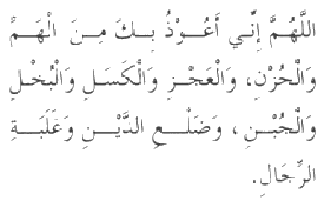Extracts from speeches and writings of Scholars on Islamic Spirituality and Purification of the Soul!
Thursday, November 20, 2014
Correct Approach to Wealth: Mufti Shafi RA
Friday, November 14, 2014
Sunnah Duas when in distress or difficulty or sorrow:
Sunnah Duas When in distress or difficulty or sorrow:
1. Ibn ‘Abbas رضي الله ﺗﻌﺎﻟﯽٰ عنه reported, “The Prophet, peace be upon him, at times of sorrow and grief used to supplicate, La ilaha illa Allah Al-’Azim, Al-’Alim, la ilaha illa Allah, Rabbul ‘arshil ‘Azim, la ilaha illa Allahu, Rabbus-Samawati wa rabbul ardi wa rabbul ‘arshi karim (There is no god but Allah, the Mighty, the Forbearing, there is no god but Allah, the Lord of the mighty throne, there is no god but Allah, the Lord of the heavens and the earth, and the Lord of the throne of honor)’.”
Source: Bukhari and Muslim.
2. Anas رضي الله ﺗﻌﺎﻟﯽٰ عنه said that when the Prophet, peace be upon him, was faced with a serious difficulty, he would always supplicate, “Ya Hayyu, ya Qayyumu, bi-rahmatika astaghithu (O the Living, O the Eternal, I seek help in Your grace). Source: Tirmidhi
3. Abu Hurairah رضي الله ﺗﻌﺎﻟﯽٰ عنه reported that whenever the Prophet, peace be upon him, was faced with a serious difficulty, he would raise his head to the sky and supplicate, “Subhan-Allah al-’Azim (glory be to Allah, the Mighty).” And when he implored seriously and strongly, he would say “Ya Hayyu, Ya Qayyum (O the Living, the Eternal One). Source: Tirmidhi
4. Abu Bakr (رضي الله ﺗﻌﺎﻟﯽٰ عنه) reported that the Prophet, peace be upon him, said, “The supplications of distress are, ‘Allahumma rahmataka arju, fala takilni ila nafsi tarfata ‘ain, wa aslih li sha’ni kullahu, la ilaha illa anta (O Allah, I hope for Your mercy, so give me not over to my self even for as little as wink of an eye, and set right all my affairs, there is no god but You).”
Source: Abu Daw’ud
6. Sa’d ibn Waqas رضي الله ﺗﻌﺎﻟﯽٰ عنه reported that the Prophet, peace be upon him, said, “The supplication made by the Companion of the Fish (Prophet Yunus) in the belly of the fish was, ‘La ilaha illa anta, subhanaka, inni kuntu minaz-zalimin (there is no god but You, You are far exalted and above all weaknesses, and I was indeed the wrongdoer)’. If any Muslim supplicates in these words, his supplication will be accepted.” In another report we read, “I know words that will cause Allah to remove one’s distress. These are the words (of supplication) of my brother Yunus, peace be upon him.” Source: Tirmidhi
7. Dua to be said every morning and evening to prevent stress & sorrow:
Allahumma inni a’udhubika minal hammi wal hazan, wal ‘ajzi wal kasal, wal bukhli wal jubn, wa dhala’id-dayni wa ghalabatir rijaal
“O Allah! I seek refuge in You from grief and sadness, from weakness and from laziness, from miserliness and from cowardice, from being overcome by debt and from being overpowered by men.” Source: Sahih al-Bukhari 7:158
(Most of the Duas taken from Fiqh-us-Sunnah, volume 4)
Friday, October 17, 2014
Patience and loving Allâh : Ibn Qayyim
Patience is one of the most important qualities demanded of those who claim to love Allâh, as the degree of patience determines those who are sincere in their claim and those who are not. The degree of patience needed to endure hardship and difficulties in order to please the Beloved proves the sincerity of one’s love.
Many claim to love Allâh, but when Allâh tests them with hardship, they forget the true essence of love. No-one can adhere to the love of Allâh except those who are patient and persevering (as-sâbirûn). If it were not for the test of hardship and sincerity, there would be no proof of the sincerity
of a person’s love of Allâh.
Tirmidhi narrated that Sa’d ibn Abi Waqqas (may Allah be pleased with him) said: I said: “O Messenger of Allah (sallallahu layhi wasallam), which of the people are most severely tested?” He said: “The Prophets, then the next best and the next best. A man will be tested in accordance with his level of religious commitment. If his religious commitment is strong, he will be tested more severely, and if his religious commitment is weak, he will be tested in accordance with his religious commitment."
The one whose love of Allâh is greater, has a greater degree of patience.
Therefore, Allâh has attributed the quality of patience to His close friends (awliyâ) and most beloved. He said about His beloved slave Ayyûb (AS):
“…Truly We found him full of patience and constancy. How excellent in Our service! Ever did he turn (to Us)!” (Sâd 38:44)
Allâh instructed the most beloved to Him of everything He created to have patience in accepting His decree and told him that patience comes only by the help of Allâh.
He praised those who have patience and promised them the best of rewards: the rewards of others are defined and limited, but the reward of as-sâbirûn is without measure.
Allah says,“…Those who patiently persevere will truly receive a reward without measure!” (az-Zumar 39:10).
Patience is vital at all levels of Islâm, îmân and ihsân, as well as being a major element in îmân (faith) and tawakkul (putting one’s trust in Allâh).
Allâh has made patience the means for attaining His love, His companionship, His help and support, and His good rewards. This is sufficient honour and blessings.
-Extracts from: 'Patience and Gratitude' By Ibn Qayyim al-Jawziyyah
An abridgement of his original work entitled, “Uddat as-Sâbireen wa Dhâkirat ash-Shâkireen”
Tuesday, October 7, 2014
HOW TO ACQUIRE THE ABILITY TO SACRIFICE FOR ALLAH?
Wednesday, August 27, 2014
The only Regret in JANNAH:
Tuesday, August 26, 2014
Exhortation Of The Predecessors (Salaf) To Taqwa
Exhortation Of The Predecessors To Taqwa
Umar (RA) wrote to his son:
--------------------------------------------------------------------------------------------------
